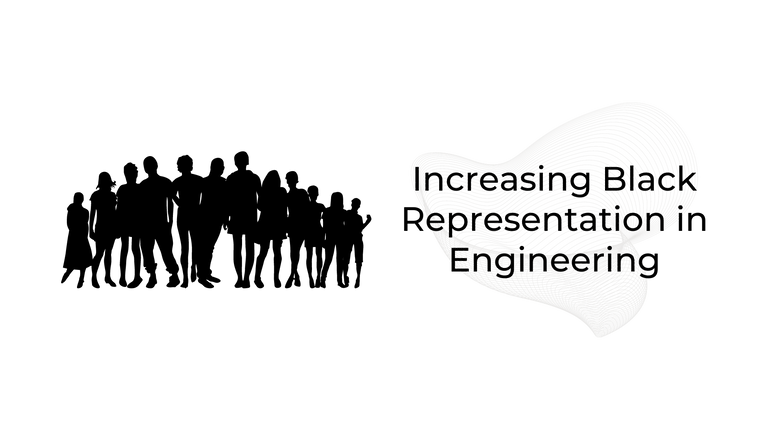Insights From a Black Engineer on Navigating Life, School, and Work
Malcolm Friday talks about his experience as a black engineer in a predominantly white field.
Over the past three decades, the growth of employment in the STEM (science, technology, engineering, and mathematics) industry has outpaced the growth of overall employment. According to a 2018 report by the Pew Research Center, STEM employment has grown 79% since 1990, from 9.7 million to 17.3 million. Similarly, computer jobs have seen a 338% increase in the same period.
But despite the colossal growth, Black people continue to be underrepresented in the STEM workforce. According to the Pew Research Center’s analysis of the 2014-2016 American Community Survey (IPUMS), only 5% of engineers in the workforce are Black.

Malcolm Friday is one of the 5%. In 2017, following in his parents and brother’s footsteps, he graduated from Howard University, a historically Black university in Washington, D.C., with a degree in electrical engineering. Friday said that after graduation, he wanted to combine his technical skills and knowledge in engineering with technology and business.
So, he took a job with West Monroe, a Chicago-based national management and technology firm that provides consulting to businesses across industries like software and high tech, energy and utilities, and healthcare and life sciences. At West Monroe, the 25-year-old acts as the middleman between employees on the business side of companies, who run and oversee operations, and engineers and designers, who are responsible for programming and coding. As a translator between the two, Friday said he
“help[s] companies solve strategic issues and help[s] leadership understand how they can better optimize their own businesses while staying true to their values.”
Friday knew he wanted to be an engineer at a young age.
“A lot of it came from my brother,” he said. “He wanted to be an engineer when he was in high school and I thought that sounded cool. But, I was also always good at math and science. So, I thought ‘Well, if I’m good at it then I should do it.’”

Friday’s successful career might be closely related to the passion for STEM classes that he developed at an early age. Studies show early exposure to STEM training is a powerful tool that can increase the chances of children understanding and considering STEM careers in their adult life.
The National Society of Black Engineers, worried about the lack of representation in the field, started a campaign in 2016 with a similar principle in mind. The campaign hopes to increase the annual number of Black engineering degrees from 3,500 in 2014 to 10,000 by 2025. According to the press release, as a part of the campaign, NSBE is hoping to reach out to 150,000 Black 7th graders across the country. The goal is to have these students
“envision themselves as engineers and pledge to achieve academic excellence in subjects such as algebra, chemistry and physics…the society will then provide online and other resources to help those students achieve their goals.”
Even with initiatives like this, the number of Black students who graduate with engineering degrees is low. For example, at the University of Pennsylvania, which has one of the top engineering schools in the country, the 2017 numbers show that only 5.4 % of the engineering school graduates were Black.
At predominantly white institutions, this is a common problem. A 2018 study by the Society of Women Engineers (SWE) and NSBE showed that one of the biggest challenges Black engineers face at college and in the industry is the lack of role models. Researchers found that a lack of Black role models often leads to a lack of confidence and feelings of isolation for Black engineers, which can then lead to students changing majors. Friday agreed.
“For me being in a space and around successful people who looked like me was the motivational factor for academics and life in general,” he said. “At Howard, being able to see so many Black people in one space, dedicated to a common goal was just very reassuring. It helped me keep going.”

According to a 2018 interview with Wayne Fredrick, the president of Howard, historically Black colleges and universities house about 25% of Black undergraduates who earn degrees in STEM. At Howard,
“actively seeing Black people try to better themselves in a field where they’re not going to be the majority is so powerful,” Friday said. “We struggled together. Seeing [the struggle] and still showing up to class every day is kind of a testament to Black people’s strong will and perseverance.”
Friday added coming from Howard and its inspiring environment helped him during his job search and his transition into the workforce, where he is one of the few Black engineers. Friday said in college he learned to refuse to be constrained to what other people think he can do and achieve.
“For me, just because you studied this, you don’t have to be a traditional engineer at Google or Microsoft,” he said. “You can use a lot of the things you learned in your degree and utilize them to do whatever you want to do. Whether you want to go into tech or consulting or law after your engineering degree… don’t let what people think of you confine you.”

Friday said learning to speak confidently about himself, his achievements, and his resume also helped him during his job search. “Being able to competently and positively talk about yourself is important,” he said. Friday added that usually, recruiters look for a very structured resume that checks certain boxes. So, it’s important to be able to acknowledge missing components in your background and explain how other non-traditional things on your resume can replace them.
“You can always say, ‘Yes, I don’t have X, Y, Z on my resume, but I have this volunteer activity, internship or club.’ Things you do have value. And as long as you understand the value of your skills and what you did and how those can help you in a job or as an engineer, you can talk confidently about yourself and your resume.”
The faith Friday has in himself, his education, and his abilities come in handy at the office too.
“When I first came in, I was super terrified,” he said. “I was worried what people’s perception of me would be because as a Black man I was entering a white workspace and I was coming from a different type of school. I felt like I had to impress all the time.”
He said he quickly realized he can’t control what his environment looks like or what people think of him.
"For me, it was learning to embrace me, tuning out all the outside noise and not worrying about other people’s opinions,” he said. “Obviously being in a workplace that is predominantly white is going to be a little intimidating, especially for up and coming Black engineers. But we deserve to be here. So it’s like, I’m just going to go out there and do me. If something bad happens, I’ll learn from it. If something good happens, I’ll learn from that too.”
Friday added that at first, it can be hard to get criticism or feedback but as long as you make sure what you do is intentional and has a purpose things will turn out OK.
“The most important advice I can give is to be true to yourself, to do what interests you and to stop worrying about what people will think of you for because you can’t ever control that.”
The information provided herein is for general informational purposes only and is not intended to provide tax, legal, or investment advice and should not be construed as an offer to sell, a solicitation of an offer to buy, or a recommendation of any security by Candor, its employees and affiliates, or any third-party. Any expressions of opinion or assumptions are for illustrative purposes only and are subject to change without notice. Past performance is not a guarantee of future results and the opinions presented herein should not be viewed as an indicator of future performance. Investing in securities involves risk. Loss of principal is possible.
Third-party data has been obtained from sources we believe to be reliable; however, its accuracy, completeness, or reliability cannot be guaranteed. Candor does not receive compensation to promote or discuss any particular Company; however, Candor, its employees and affiliates, and/or its clients may hold positions in securities of the Companies discussed.
